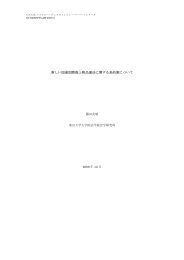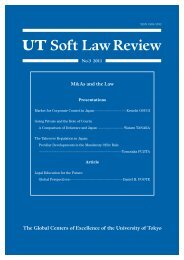UT Soft Law Review
UT Soft Law Review
UT Soft Law Review
You also want an ePaper? Increase the reach of your titles
YUMPU automatically turns print PDFs into web optimized ePapers that Google loves.
<strong>UT</strong> <strong>Soft</strong> <strong>Law</strong> <strong>Review</strong> No.2 2010issued at a generally more favorable price). By contrast, a share split does nothing more thansimply subdivide the shares so as to create a greater number of shares than at present. Itfollows that, excluding the event where two or more classes of shares might have been issuedin the split, notwithstanding that the number of shares that a shareholder comes to own mayincrease as a result of the split, since there will be no change in the percentage of theshareholder’s voting rights or in the overall value of his/her shares once all the shares resultingfrom the split are aggregated, it is not possible to imagine in any normal circumstances thatthe shareholder is likely to suffer a disadvantage, be it a reduction in the percentage of his/hervoting rights or financial losses in the form of a lower share price. For that reason thisprovision of the Commercial Code did not provide a similar right to seek an injunction againsta share split as provided in respect of a new share issue.”“Since this Court is unable to find that the Share Split will bring about a material change inthe interests of Company Y’s shareholders, there can be no application by analogy of Article280-10 of the Commercial Code.”(3) Validity of the Board Resolution“In the event of a dispute over managerial control of an enterprise, the decision to entrustmanagement to either the current board of management or to the ‘hostile’ purchaser (in thesense of ‘opposed by the company’s current managers’; the same applies hereinafter) is to bemade by the shareholders. Accordingly, so that the shareholders can make this decisionproperly, the board of directors may be regarded as permitted to exercise its authority so asto provide shareholders with any information that they will need and to secure a reasonableperiod of time for their due consideration of that information. It follows that following theappearance of a hostile purchaser vying for control of the company, it cannot be described asan abuse of authority by the board of directors for it to secure from that hostile purchaser aproposed business plan and a period of time to study that plan, hold formal discussions withthat purchaser on the details of that business plan, express its opinion on the plan andaccordingly on the takeover in its capacity as the board of directors and in addition, presentany alternative plans to the shareholders, so long as both the content of the material to besubmitted and the period for examination that the board requests are reasonable.”“The question of whether the defensive measures adopted by the board of directors arereasonable or not is to be decided by taking into overall consideration factors including theintention of the board of directors in adopting the defensive measures, the circumstancesbehind and leading up to the adoption of those defensive measures, whether or not thedefensive measures will disadvantage existing shareholders, and if so, to what extent, and theeffect of the defensive measures on impeding the takeover.”“Restrictions on the authority of the board of directors, which are based on maintainingthe principle that it is the shareholders of a stock company that elect its directors and not120





